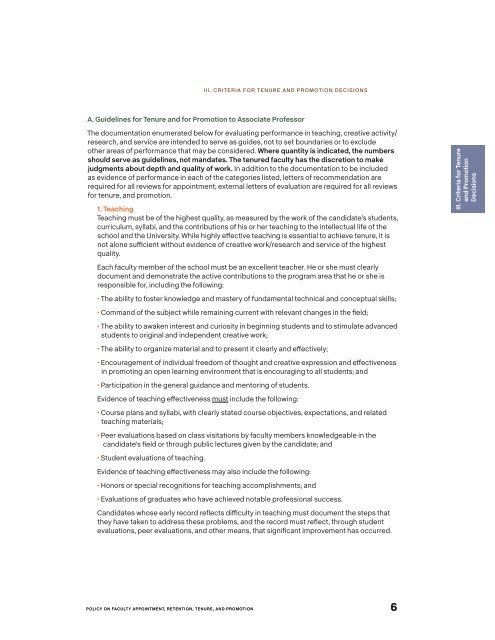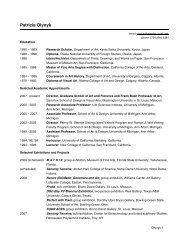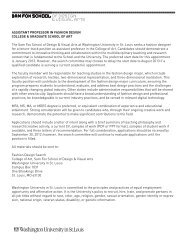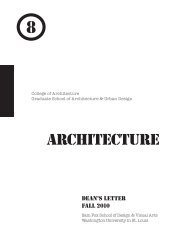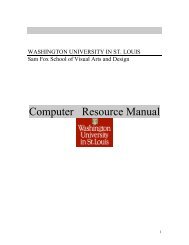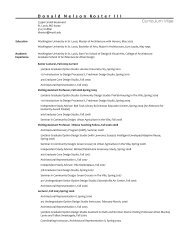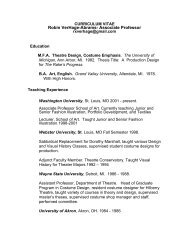Tenure & Promotion Policy - Sam Fox School - Washington ...
Tenure & Promotion Policy - Sam Fox School - Washington ...
Tenure & Promotion Policy - Sam Fox School - Washington ...
You also want an ePaper? Increase the reach of your titles
YUMPU automatically turns print PDFs into web optimized ePapers that Google loves.
A. Guidelines for <strong>Tenure</strong> and for <strong>Promotion</strong> to Associate Professor<br />
The documentation enumerated below for evaluating performance in teaching, creative activity/<br />
research, and service are intended to serve as guides, not to set boundaries or to exclude<br />
other areas of performance that may be considered. Where quantity is indicated, the numbers<br />
should serve as guidelines, not mandates. The tenured faculty has the discretion to make<br />
judgments about depth and quality of work. In addition to the documentation to be included<br />
as evidence of performance in each of the categories listed, letters of recommendation are<br />
required for all reviews for appointment; external letters of evaluation are required for all reviews<br />
for tenure, and promotion.<br />
1. Teaching<br />
Teaching must be of the highest quality, as measured by the work of the candidate’s students,<br />
curriculum, syllabi, and the contributions of his or her teaching to the intellectual life of the<br />
school and the University. While highly effective teaching is essential to achieve tenure, it is<br />
not alone sufficient without evidence of creative work/research and service of the highest<br />
quality.<br />
Each faculty member of the school must be an excellent teacher. He or she must clearly<br />
document and demonstrate the active contributions to the program area that he or she is<br />
responsible for, including the following:<br />
• The ability to foster knowledge and mastery of fundamental technical and conceptual skills;<br />
• Command of the subject while remaining current with relevant changes in the field;<br />
• The ability to awaken interest and curiosity in beginning students and to stimulate advanced<br />
students to original and independent creative work;<br />
• The ability to organize material and to present it clearly and effectively;<br />
• Encouragement of individual freedom of thought and creative expression and effectiveness<br />
in promoting an open learning environment that is encouraging to all students; and<br />
• Participation in the general guidance and mentoring of students.<br />
Evidence of teaching effectiveness must include the following:<br />
• Course plans and syllabi, with clearly stated course objectives, expectations, and related<br />
teaching materials;<br />
• Peer evaluations based on class visitations by faculty members knowledgeable in the<br />
candidate’s field or through public lectures given by the candidate; and<br />
• Student evaluations of teaching.<br />
iii. criteria for tenure and promotion decisions<br />
Evidence of teaching effectiveness may also include the following:<br />
• Honors or special recognitions for teaching accomplishments; and<br />
• Evaluations of graduates who have achieved notable professional success.<br />
Candidates whose early record reflects difficulty in teaching must document the steps that<br />
they have taken to address these problems, and the record must reflect, through student<br />
evaluations, peer evaluations, and other means, that significant improvement has occurred.<br />
policy on faculty appointment, retention, tenure, and promotion 6<br />
III. Criteria for <strong>Tenure</strong><br />
and <strong>Promotion</strong><br />
Decisions


